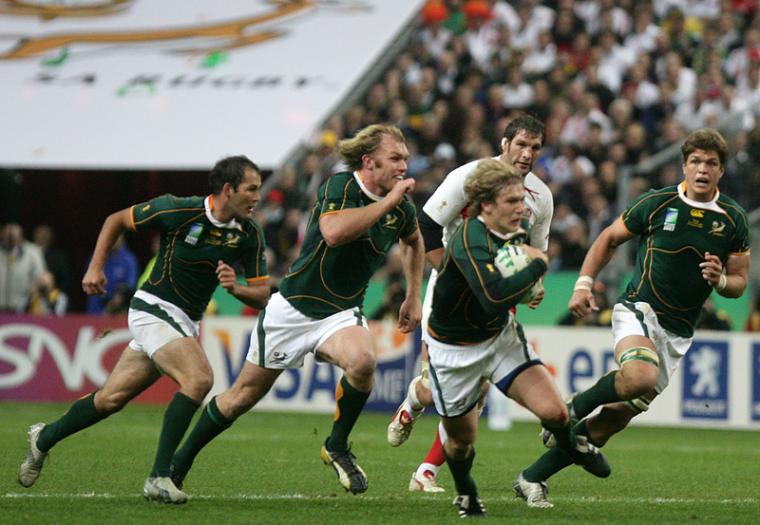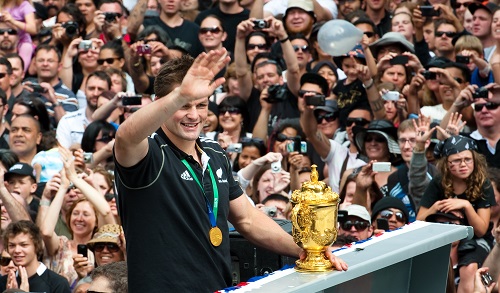
The news earlier this month that the U.S. will be hosting the Rugby World Cup in 2031 and 2033 has resulted in a flurry of activity – and not just the excitement over another major sports event.
According to news carried by Biz New Orleans, USA Rugby and the United States Rugby World Cup Bid Committee pursued a novel bid approach by seeking the opportunity to host men’s and women’s tournaments back-to-back in 2031 and 2033. This was seen as an excellent opportunity to set the stage for the growth of the game over the next decade.
World Rugby is hoping that hosting here will provide the impetus the U.S. needs in order to start programs and host more events.
Alan Gilpin, chief executive of World Rugby, told the Financial Times that the international governing body would invest in increasing the popularity of the sport in this country in the years leading up to the tournaments, potentially with the backing of external investors.
 “Can we be clever and fund growth with other people’s money? You know, to put it bluntly, if we can, great. But then the question is, what part of the return on investment are you potentially passing over to a third party? “We need to help USA Rugby . . . fund participation programs and competitions through schools, colleges and universities [and] getting their own [teams] playing in competitions,” Gilpin said. “It’s investment in the whole spectrum, from grassroots through to elite sport.”
“Can we be clever and fund growth with other people’s money? You know, to put it bluntly, if we can, great. But then the question is, what part of the return on investment are you potentially passing over to a third party? “We need to help USA Rugby . . . fund participation programs and competitions through schools, colleges and universities [and] getting their own [teams] playing in competitions,” Gilpin said. “It’s investment in the whole spectrum, from grassroots through to elite sport.”
Challenges to Growth: At the moment, rugby is largely viewed as a niche sport in the U.S. – at least compared to football, soccer, lacrosse, field hockey and baseball, all of which boast a plethora of youth programs in almost every city nationwide. And one thing most rugby aficionados agree on is the need to get children started early if the U.S. is ever going to grow the game.
Even established programs, however, are struggling. An article in The Guardian notes in part, “American rugby lovers, alas, know limits all too well. From high school to college, from the amateurs to the pros of Major League Rugby, clubs grapple with poor facilities and finance, with harsh winters which split the season in two, and with travel demands which challenge even the most dedicated team.”
USA Rugby had its share of hardships as well, filing for bankruptcy in March of 2020, a casualty of COVID. It officially exited bankruptcy in August of that same year, following court approval. At the time, CEO Ross Young noted it was time for the “hands-on rebuilding process” of the organization and its work for the sport.
But make no mistake: The sport of rugby is on the grow here, says Sportico, where the following statistics were noted:
“Despite the crowded U.S. sports landscape, Americans’ passion for rugby is real. According to research from Nielsen, rugby is already the fastest growing sport in the United States, and in a recent YouGov poll, 80% of sports fans said they support the United States hosting a Rugby World Cup. The potential is right in front of us.
A U.S.-hosted Rugby World Cup is also smart business. American sports fans may not realize that the men’s Rugby World Cup ranks as the third largest sporting event in the world behind the FIFA World Cup and Summer Olympics. Rugby boasts more than 405 million fans globally, and the quadrennial tournament typically sees between 150,000 and 410,000 international travelers visit the host nation to experience the games. The 2019 Rugby World Cup yielded more than $5 billion in economic impact, and estimates suggest a U.S.-hosted men’s event could see up to 3.1 million supporters attend matches.”
That, of course, leads right into the next piece of information, and perhaps one of the most essential pieces of the puzzle.
Hosting Opportunities: Almost within minutes of the announcement, the news was picked up and distributed by sports commissions in major cities across the country. And USA Rugby has noted that there are more than 20 American cities that are potential hosts. Among those, according to Biz New Orleans, are the following:
- Atlanta, Georgia
- Austin, Texas
- Baltimore, Maryland
- Birmingham, Alabama
- Boston, Massachusetts
- Charlotte, North Carolina
- Chicago, Illinois
- Dallas, Texas
- Glendale, Arizona
- Houston, Texas
- Kansas City, Missouri
- Los Angeles, California
- Miami, Florida
- Minneapolis, Minnesota
- Nashville, Tennessee
- New Orleans, Louisiana
- New York/New Jersey
- Orlando, Florida
- Philadelphia, Pennsylvania
- Pittsburgh, Pennsylvania
- San Diego, California
- San Francisco Bay Area, California
- Seattle, Washington
- Washington, D.C.
If many of those look familiar to you…well, they should. You have been seeing them lobbying to host the FIFA World Cup in 2026. Many of the CVBs and sports commissions in these cities have already noted they are interested in hosting and are planning to bid as soon as the opportunity arises.
As with the FIFA World Cup, the Rugby World Cup is an event that spans multiple games. According to NPR, the men's tournament features 20 teams, split into pools and playing almost 50 games total over seven weeks at venues spread across the host country. The women's World Cup will have 16 teams playing in a similar format; typically there have been 12 teams, but the sport's governing body is expanding the tournament (effective in 2025) as part of its efforts to grow the women's game.
But successful bids will have to take into consideration a number of factors, even beyond a local community that would support the event, and even beyond clubs that could promote it. That brings up another challenge to rugby’s growth in the USA.
Lack of Purpose-Built Facilities: As with many niche sports in the U.S., rugby has had to contend with a shortage of sport-specific fields. In some cases, rugby is played on soccer or football fields; however, the dimensions vary. According to Wikipedia, a rugby league playing field is 100 meters (110 yards) long, whereas an American football field is 100 yards (91 meters) long. USA Rugby does provide guidelines on for matches on American football fields. (Most of the cities named above as potential hosts in 2031 and 2033 will be bidding to host events at stadiums that typically see NFL play).
But Ross Young is optimistic about the prospect, noting in a statement that USA Rugby is excited to see the sport venture into what is essentially a brave new world:
“USA Rugby will now venture into a new era and ensure the sport’s most treasured event is a springboard for creating lasting, sustainable enthusiasm and passion for rugby from coast to coast. We look forward to partnering with World Rugby in the years ahead to ensure that our preparations for these tournaments and the events themselves are a paradigm-shifting catalyst for the growth of our sport, not only here in the United States but around the world.”

